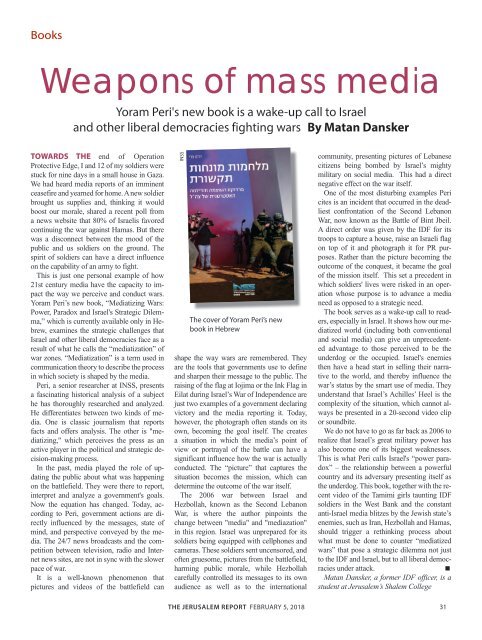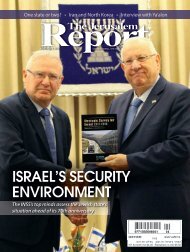All small
You also want an ePaper? Increase the reach of your titles
YUMPU automatically turns print PDFs into web optimized ePapers that Google loves.
Books<br />
Weapons of mass media<br />
Yoram Peri's new book is a wake-up call to Israel<br />
and other liberal democracies fighting wars By Matan Dansker<br />
TOWARDS THE end of Operation<br />
Protective Edge, I and 12 of my soldiers were<br />
stuck for nine days in a <strong>small</strong> house in Gaza.<br />
We had heard media reports of an imminent<br />
ceasefire and yearned for home. A new soldier<br />
brought us supplies and, thinking it would<br />
boost our morale, shared a recent poll from<br />
a news website that 80% of Israelis favored<br />
continuing the war against Hamas. But there<br />
was a disconnect between the mood of the<br />
public and us soldiers on the ground. The<br />
spirit of soldiers can have a direct influence<br />
on the capability of an army to fight.<br />
This is just one personal example of how<br />
21st century media have the capacity to impact<br />
the way we perceive and conduct wars.<br />
Yoram Peri’s new book, “Mediatizing Wars:<br />
Power, Paradox and Israel's Strategic Dilemma,”<br />
which is currently available only in Hebrew,<br />
examines the strategic challenges that<br />
Israel and other liberal democracies face as a<br />
result of what he calls the “mediatization” of<br />
war zones. “Mediatization” is a term used in<br />
communication theory to describe the process<br />
in which society is shaped by the media.<br />
Peri, a senior researcher at INSS, presents<br />
a fascinating historical analysis of a subject<br />
he has thoroughly researched and analyzed.<br />
He differentiates between two kinds of media.<br />
One is classic journalism that reports<br />
facts and offers analysis. The other is "mediatizing,"<br />
which perceives the press as an<br />
active player in the political and strategic decision-making<br />
process.<br />
In the past, media played the role of updating<br />
the public about what was happening<br />
on the battlefield. They were there to report,<br />
interpret and analyze a government's goals.<br />
Now the equation has changed. Today, according<br />
to Peri, government actions are directly<br />
influenced by the messages, state of<br />
mind, and perspective conveyed by the media.<br />
The 24/7 news broadcasts and the competition<br />
between television, radio and Internet<br />
news sites, are not in sync with the slower<br />
pace of war.<br />
It is a well-known phenomenon that<br />
pictures and videos of the battlefield can<br />
INSS<br />
The cover of Yoram Peri’s new<br />
book in Hebrew<br />
shape the way wars are remembered. They<br />
are the tools that governments use to define<br />
and sharpen their message to the public. The<br />
raising of the flag at Iojima or the Ink Flag in<br />
Eilat during Israel’s War of Independence are<br />
just two examples of a government declaring<br />
victory and the media reporting it. Today,<br />
however, the photograph often stands on its<br />
own, becoming the goal itself. The creates<br />
a situation in which the media’s point of<br />
view or portrayal of the battle can have a<br />
significant influence how the war is actually<br />
conducted. The “picture” that captures the<br />
situation becomes the mission, which can<br />
determine the outcome of the war itself.<br />
The 2006 war between Israel and<br />
Hezbollah, known as the Second Lebanon<br />
War, is where the author pinpoints the<br />
change between "media" and "mediazation"<br />
in this region. Israel was unprepared for its<br />
soldiers being equipped with cellphones and<br />
cameras. These soldiers sent uncensored, and<br />
often gruesome, pictures from the battlefield,<br />
harming public morale, while Hezbollah<br />
carefully controlled its messages to its own<br />
audience as well as to the international<br />
community, presenting pictures of Lebanese<br />
citizens being bombed by Israel’s mighty<br />
military on social media. This had a direct<br />
negative effect on the war itself.<br />
One of the most disturbing examples Peri<br />
cites is an incident that occurred in the deadliest<br />
confrontation of the Second Lebanon<br />
War, now known as the Battle of Bint Jbeil.<br />
A direct order was given by the IDF for its<br />
troops to capture a house, raise an Israeli flag<br />
on top of it and photograph it for PR purposes.<br />
Rather than the picture becoming the<br />
outcome of the conquest, it became the goal<br />
of the mission itself. This set a precedent in<br />
which soldiers' lives were risked in an operation<br />
whose purpose is to advance a media<br />
need as opposed to a strategic need.<br />
The book serves as a wake-up call to readers,<br />
especially in Israel. It shows how our mediatized<br />
world (including both conventional<br />
and social media) can give an unprecedented<br />
advantage to those perceived to be the<br />
underdog or the occupied. Israel's enemies<br />
then have a head start in selling their narrative<br />
to the world, and thereby influence the<br />
war’s status by the smart use of media. They<br />
understand that Israel’s Achilles’ Heel is the<br />
complexity of the situation, which cannot always<br />
be presented in a 20-second video clip<br />
or soundbite.<br />
We do not have to go as far back as 2006 to<br />
realize that Israel’s great military power has<br />
also become one of its biggest weaknesses.<br />
This is what Peri calls Israel's “power paradox”<br />
– the relationship between a powerful<br />
country and its adversary presenting itself as<br />
the underdog. This book, together with the recent<br />
video of the Tamimi girls taunting IDF<br />
soldiers in the West Bank and the constant<br />
anti-Israel media blitzes by the Jewish state’s<br />
enemies, such as Iran, Hezbollah and Hamas,<br />
should trigger a rethinking process about<br />
what must be done to counter “mediatized<br />
wars” that pose a strategic dilemma not just<br />
to the IDF and Israel, but to all liberal democracies<br />
under attack. <br />
<br />
Matan Dansker, a former IDF officer, is a<br />
student at Jerusalem’s Shalem College<br />
THE JERUSALEM REPORT FEBRUARY 5, 2018 31
















